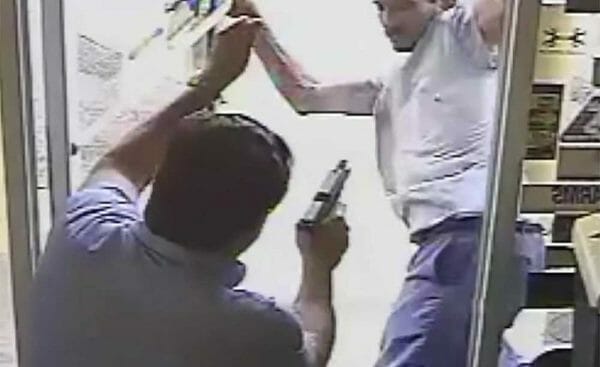USA – -(AmmoLand.com)- On October 3, 2018, Michael Dunn—a City Commissioner for the city of Lakeland FL—shot and killed Cristobal Lopez as Lopez was shoplifting a hatchet from Dunn’s store, reports TheLedger, a local paper.
The shooting occurred as Dunn was attempting to stop Lopez from leaving the store with the hatchet. The struggle at the door, the shooting, and the rapid demise of Lopez were all captured on the store’s security recording, which you can view below.
The facts of this case involve issues of both defense of property and defense of person.
Defense of Property as Justification for Deadly Force
In this instance the defense of property issue is limited to the defense of least-defensible (tangible) property, rather than the defense of highly-defensible property (such as a dwelling) which would provide for more relaxed conditions for the use of deadly defensive force.
The tangible property in this instance is the hatchet Lopez was attempting to shoplift.
The use of force in defense of tangible property is governed by Florida law by §776.031. Florida statute §776.031 allows for the use of force in defense of property against a person who is attempting to commit criminal interference, for example theft, of that property.
Here Dunn clearly had right of possession to the hatchet in his store, and Lopez’ attempt to steal that hatchet was also clearly criminal interference with that property. Accordingly, Dunn was entitled to use force against Lopez to the extent necessary to prevent Lopez’ criminal interference with that property.
However, §776.031 explicitly provides that whatever degree of force is used in defense of such tangible property, the use of deadly force is notpermissible (“read…except deadly force…”). Shooting and killing Lopez unambiguously qualifies as deadly force. So Dunn cannot justify his use of deadly force as defense of property.
Defense of Person as Justification for Deadly Force
This leaves Dunn with defense of person as his sole remaining legal justification for his use of deadly force. Florida has several statutes dealing with the use of deadly defensive force in defense of persons, including §776.012 Use or threatened use of force in defense of person and §782.02 Justifiable use of deadly force.
In summary, both §776.012 and §782.02 that provide for the use of deadly defensive force in defense of persons require that either the defender be facing an imminent threat of death or grave bodily harm or that he be resisting an attempt by that other person to murder him or commit a forcible felony upon him.
Evidence of an Imminent Deadly Force Threat is Weak
In viewing the surveillance video, however, it is not at all clear that Dunn’s use of deadly force, at the moment it was used, was necessary to prevent his own death or great bodily harm.
Although Lopez may have held the hatchet—a potentially deadly weapon—in his right hand, that hand was extended away from Dunn and was being used to open the store’s door in an apparent effort to escape with the stolen property, and the hatchet was not being held or wielded in a threatening manner, nor to murder Dunn or commit a felony upon Dunn.
Here’s an image showing the two men’s relative positions at the moment Dunn shot Lopez:

The facts of this case as we know them so far, then, do not appear to legally justify Dunn’s actions. Given the binary nature of justification defenses, should Dunn’s justification claim fail he’s left with 100% criminal liability for killing Lopez. Indeed, if it merely appears that Dunn’s justification claim is vulnerable to attack, that alone may be sufficient to encourage prosecution.
Was It Worth It?
The technical legal details aside, it’s also worth asking what I urge all my students and clients to contemplate—will that use of force have been worth it?
In this case Dunn killed Lopez over a $16 hatchet. Even if no charges are ever brought against Dunn, he still exposed himself to at least the potential of a murder trial, not to mention having to live with killing a man over $16.
And should charges be brought, and Dunn convicted, he faces perhaps the rest of his life in prison—over a $16 hatchet. I expect it isn’t hard for anyone reading this to come up with other ways Dunn could have dealt with Lopez’s theft that includes a reasonable prospect of recovering the hatchet, without resulting in Lopez’s death and Dunn’s criminal prosecution.
— Andrew
Learn more about self-defense law from Attorney Andrew F. Branca and Law of Self Defense LLC by visiting the Law of Self Defense Patreon page for both free and paid-access content, and by viewing his free weekly Law of Self Defense Show.
Learn more about CCW Safe, LLC at https://CCWSafe.Com
 About CCW Safe, LLC:
About CCW Safe, LLC:
Founded by former police officers and attorneys who have all worked on local, and federal levels of law enforcement, CCW Safe, LLC offers legal service membership plans for concealed-carry permit/license holders and law enforcement officers. Two of the founders, Mike Darter and Stan Campbell, have spent more than 20 years each in law enforcement and have been victim of federal lawsuits themselves from shooting and use of force incidents as police officers. General Counsel, Kyle Sweet, is a former police officer and current owner of Sweet Law Firm, representing hospitals and health care professional across the United States. With a strong membership base in 50 states, CCW Safe will have the most experienced attorneys in the jurisdiction of the incident handle members’ cases. Learn more on how to become a member at CCWSafe.Com.
